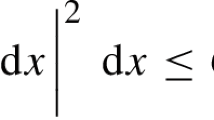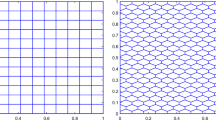Abstract
We consider the virtual element method (VEM) introduced by Beirão da Veiga et al. in 2016 for the numerical solution of the steady, incompressible Navier–Stokes equations; the method has arbitrary order \({k} \ge {2}\) and guarantees divergence-free velocities. For such discretization, we develop a residual-based a posteriori error estimator, which is a combination of standard terms in VEM analysis (residual terms, data oscillation, and VEM stabilization), plus some other terms originated by the VEM discretization of the nonlinear convective term. We show that a linear combination of the velocity and pressure errors is upper bounded by a multiple of the estimator (reliability). We also establish some efficiency results, involving lower bounds of the error. Some numerical tests illustrate the performance of the estimator and of its components while refining the mesh uniformly, yielding the expected decay rate. At last, we apply an adaptive mesh refinement strategy to the computation of the low-Reynolds flow around a square cylinder inside a channel.
Similar content being viewed by others
Data Availability
Data are available from the authors upon request.
References
Beirão da Veiga, L., Brezzi, F., Cangiani, A., Manzini, G., Marini, L.D., Russo, A.: Basic principles of virtual element methods. Math. Models Methods Appl. Sci. 23(01), 199–214 (2013). https://doi.org/10.1142/S0218202512500492
Beirão da Veiga, L., Brezzi, F., Marini, L.D., Russo, A.: The hitchhiker’s guide to the virtual element method. Math. Models Methods in Appl. Sci. 24(08), 1541–1573 (2014). https://doi.org/10.1142/S021820251440003X
Beirão da Veiga, L., Lovadina, C., Vacca, G.: Divergence free virtual elements for the Stokes problem on polygonal meshes. ESAIM: M2AN 51(2), 509–535 (2017). https://doi.org/10.1051/m2an/2016032
Beirão da Veiga, L., Lovadina, C., Vacca, G.: Virtual elements for the Navier-Stokes problem on polygonal meshes. SIAM J. Numer. Anal. 56(3), 1210–1242 (2018). https://doi.org/10.1137/17M1132811
Wang, G., Wang, Y., He, Y.: A posteriori error estimates for the virtual element method for the Stokes problem. J. Sci. Comput. 84(37), 1–25 (2020). https://doi.org/10.1007/s10915-020-01281-2
Wang, Y., Wang, G., Wang, F.: An adaptive virtual element method for incompressible flow. Comput. Math. Appl. 101, 63–73 (2021). https://doi.org/10.1016/j.camwa.2021.09.012
Beirão da Veiga, L., Canuto, C., Nochetto, R.H., Vacca, G.: Equilibrium analysis of an immersed rigid leaflet by the virtual element method. Math. Models Methods Appl. Sci. 31(7), 1323–1372 (2021)
Beirão da Veiga, L., Canuto, C., Nochetto, R.H., Vacca, G., Verani, M.: Adaptive VEM: stabilization-free a posteriori error analysis and contraction property. SIAM J. Numer. Anal. 61(2), 457–494 (2023). https://doi.org/10.1137/21M1458740
Breuer, M., Bernsdorf, J., Zeiser, T., Durst, F.: Accurate computations of the laminar flow past a square cylinder based on two different methods: lattice-Boltzmann and finite-volume. Int. J. Heat Fluid Flow. 21(2), 186–196 (2000). https://doi.org/10.1016/S0142-727X(99)00081-8
Beirão da Veiga, L., Manzini, G.: Residual a posteriori error estimation for the virtual element method for elliptic problems. ESAIM Math. Model. Numer. Anal. 49(2), 577–599 (2015). https://doi.org/10.1051/m2an/2014047
Cangiani, A., Georgoulis, E.H., Pryer, T., Sutton, O.J.: A posteriori error estimates for the virtual element method. Numer. Math. 137, 857–893 (2017). https://doi.org/10.1007/s00211-017-0891-9
Ainsworth, M., Oden, J.T.: A posteriori error estimation in finite element analysis. Comput. Methods Appl. Mech. Eng. 142(1), 1–88 (1997). https://doi.org/10.1016/S0045-7825(96)01107-3
Vacca, G.: An H1-conforming virtual element for Darcy and Brinkman equations. Mathematical Models and Methods in Applied Sciences 28(01), 159–194 (2018). https://doi.org/10.1142/S0218202518500057
Verfürth, R.: A review of a posteriori error estimation and adaptive mesh-refinement techniques. Wiley, Stuttgart (1996)
Kanschat, G., Schötzau, D.: Energy norm a posteriori error estimation for divergence-free discontinuous Galerkin approximations of the Navier-Stokes equations. Internat. J. Numer. Methods Fluids 57(9), 1093–1113 (2008). https://doi.org/10.1002/fld.1795
Sutton, O.J.: The virtual element method in 50 lines of MATLAB. Numer Algor 75, 1141–1159 (2017). https://doi.org/10.1007/s11075-016-0235-3
Gunzburger, M.D., Peterson, J.S.: Predictor and steplength selection in continuation methods for the Navier-Stokes equations. Comput Math Appl 22(8), 73–81 (1991). https://doi.org/10.1016/0898-1221(91)90015-V
Funding
This research was done in the framework of the Italian MIUR Award “Dipartimenti di Eccellenza 2018-2022” granted to the Department of Mathematical Sciences, Politecnico di Torino (CUP: E11G18000350001). CC is a member of the Italian INdAM-GNCS research group and was supported by the MIUR PRIN Project 201752HKH8-003.
Author information
Authors and Affiliations
Corresponding author
Ethics declarations
Competing interests
The authors declare no competing interests.
Additional information
Communicated by: Paul Houston
Publisher's Note
Springer Nature remains neutral with regard to jurisdictional claims in published maps and institutional affiliations.
Rights and permissions
Springer Nature or its licensor (e.g. a society or other partner) holds exclusive rights to this article under a publishing agreement with the author(s) or other rightsholder(s); author self-archiving of the accepted manuscript version of this article is solely governed by the terms of such publishing agreement and applicable law.
About this article
Cite this article
Canuto, C., Rosso, D. A posteriori error analysis and adaptivity for a VEM discretization of the Navier–Stokes equations. Adv Comput Math 49, 90 (2023). https://doi.org/10.1007/s10444-023-10081-9
Received:
Accepted:
Published:
DOI: https://doi.org/10.1007/s10444-023-10081-9
Keywords
- A posteriori estimator
- Adaptivity
- Virtual element method
- Navier–Stokes equations
- Computational fluid dynamics




